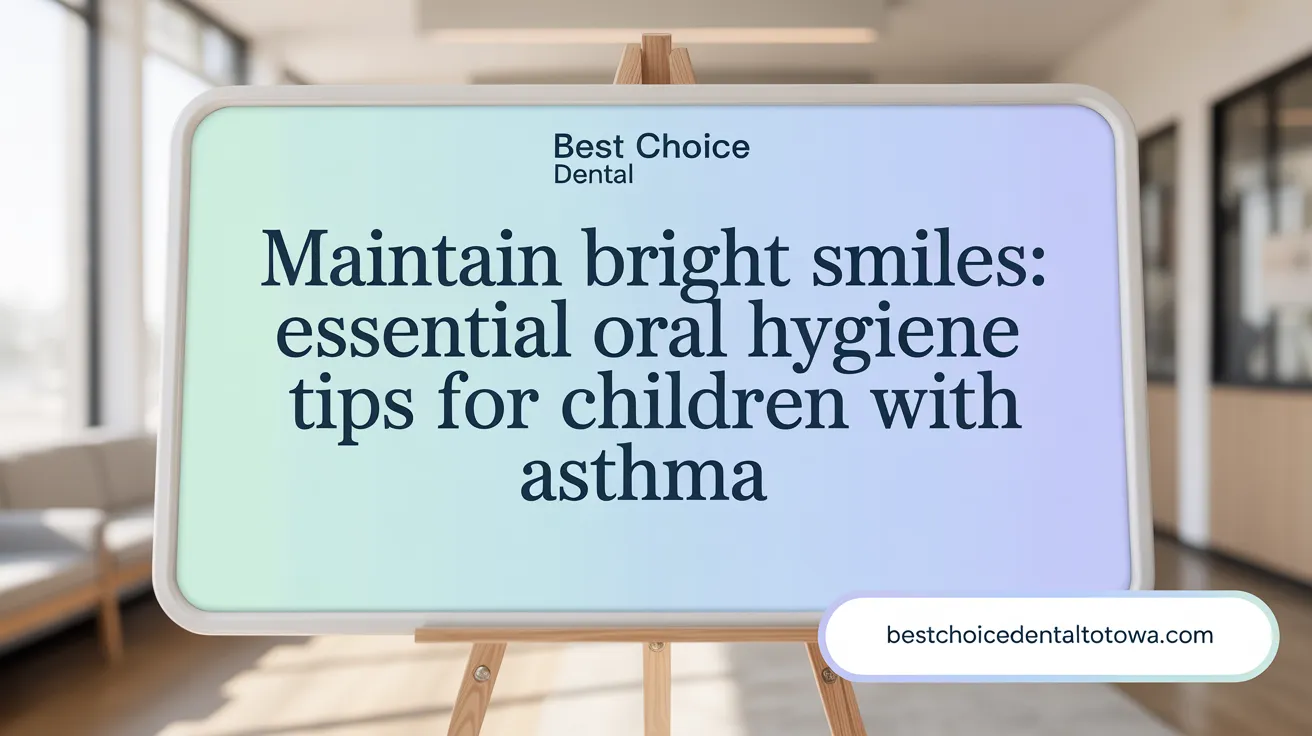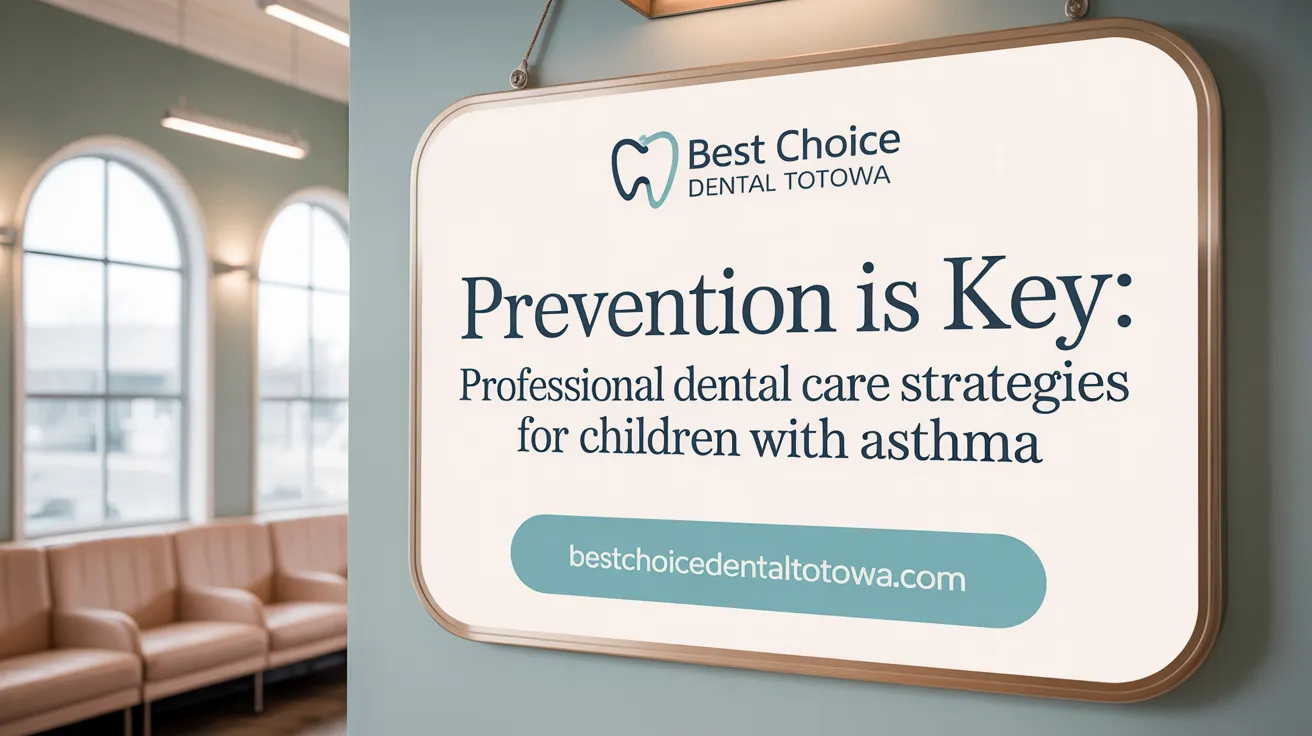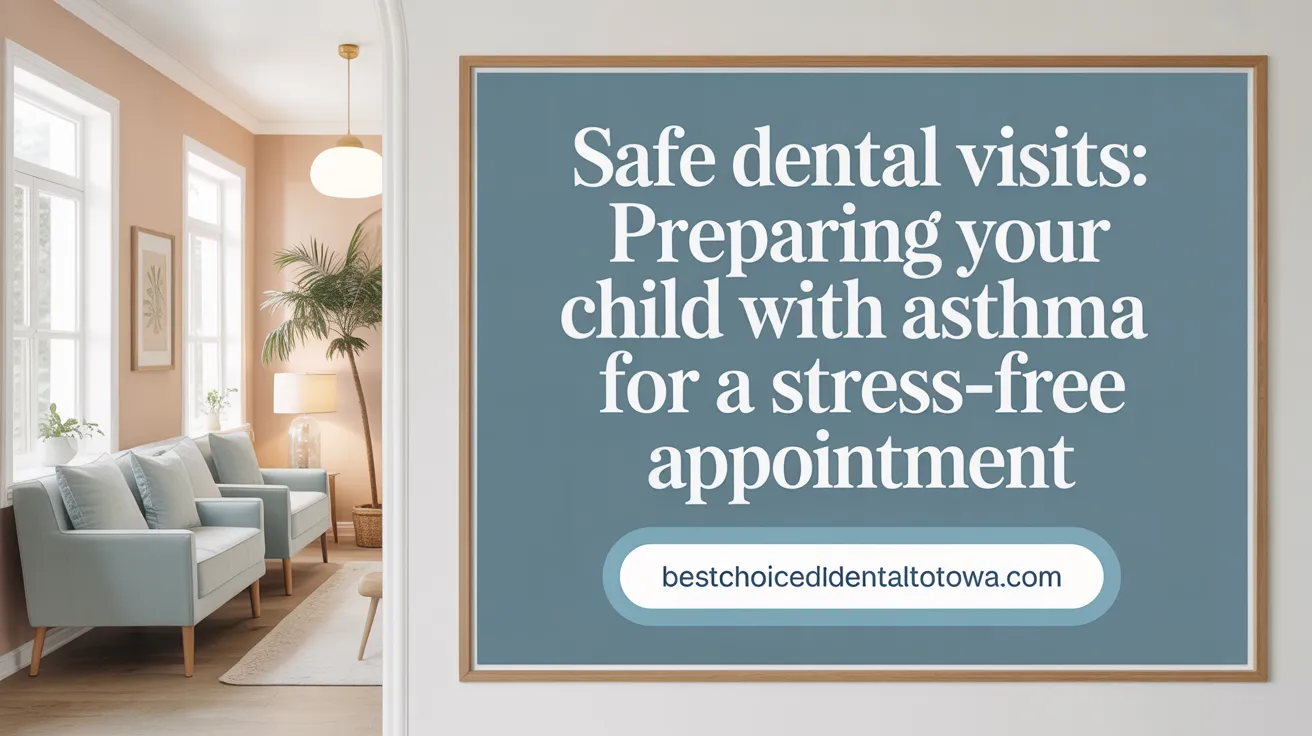Understanding the Link Between Asthma and Oral Health
Children with asthma face unique challenges when it comes to maintaining their oral health. The medications used to control asthma, alongside the condition itself, can increase risks for cavities, gum disease, dry mouth, and other dental issues. This guide provides vital oral health care tips to help parents and caregivers protect the dental well-being of children managing asthma.
Why Children with Asthma Are Prone to Oral Health Issues

Effects of asthma medications on saliva and oral environment
Children with asthma frequently use inhaled medications such as bronchodilators and corticosteroids. These drugs can decrease saliva production, causing dry mouth (xerostomia). Since saliva helps neutralize acids and wash away harmful bacteria, a reduction compromises the mouth's natural defense, leading to increased tooth decay and enamel erosion. Moreover, some inhalers are acidic or contain sugars, further promoting cavity formation (Asthma Treatment and Oral Health).
Impact of mouth breathing on oral health
Asthma often causes children to breathe through their mouths, especially during attacks or nasal obstruction. Mouth breathing drys out oral tissues and saliva, creating an environment favorable for bacterial buildup. This condition exacerbates the risk of dental caries, gum inflammation, and periodontal disease (Asthma and dental health in children).
Common oral health problems among children with asthma
Due to these factors, children with asthma have a higher prevalence of dental issues. They are more susceptible to cavities, gingivitis, enamel defects, and oral fungal infections such as thrush. The use of inhaled steroids is particularly associated with oral candidiasis. Additionally, prolonged medication use correlates with increased plaque accumulation and periodontal problems (Oral health assessment in children with asthma).
Why are children with asthma more susceptible to dental problems?
Children with asthma often experience dry mouth from inhaled bronchodilators and corticosteroids, reducing saliva flow—critical for oral protection. Mouth breathing associated with asthma dries out oral tissues, fostering bacteria growth. Together, these factors increase their likelihood of cavities, enamel erosion, gum disease, and fungal infections like thrush.
Maintaining hydration, practicing good oral hygiene with fluoride toothpaste, rinsing after inhaler use, and regular dental visits are important strategies to mitigate these risks.
Key Oral Hygiene Practices for Children with Asthma

What daily oral care practices should parents encourage for children with asthma?
Parents of children with asthma should emphasize consistent and gentle oral hygiene routines. Brushing teeth twice daily with fluoride toothpaste is crucial. The recommended fluoride concentration for effective cavity prevention is typically between 1350 to 1500 ppm (fluoride toothpaste for children).
Daily flossing is equally important to remove plaque buildup between teeth, preventing gum disease. Since children with asthma may have sensitive gums especially when using inhalers, parents should supervise and assist flossing until the child is proficient, usually around age 6 to 8 (Oral hygiene tips for children with asthma).
Using a soft-bristled toothbrush helps avoid gum irritation and discomfort, which can be more common due to dryness linked to asthma medications (Special dental care for asthmatic children.
After each use of an asthma inhaler, it is beneficial for children to rinse their mouth thoroughly with water. This practice helps remove medication residues like corticosteroids that can cause tooth enamel erosion and oral thrush (Rinsing mouth after inhaler use).
Proper hydration throughout the day supports saliva production, which naturally cleanses the mouth and neutralizes acids. Saliva helps counteract the dry mouth effect caused by many asthma medications, reducing the risk of cavities and gum disease (Managing Oral Health with Asthma).
By following these well-rounded oral care routines, children with asthma can maintain better dental health despite the challenges posed by their condition and its treatment (Dental health challenges in children with asthma.
Preventive Measures and Professional Dental Care

When should children with asthma begin dental visits and how often should they go?
Children with asthma should see a pediatric dentist by 12 months of age or within six months after their first tooth appears. Starting dental care early is crucial to prevent cavities and other oral health issues common in asthmatic children due to their medication-related risks. Regular dental check-ups are typically recommended every six months. However, children with a higher risk of cavities or oral health complications associated with asthma may require more frequent visits for monitoring and preventive care (Dental care for children with asthma, First dental visit by 12 months, Regular dental check-ups every 6 months.
What preventive treatments help protect the teeth of children with asthma?
Dentists often recommend fluoride treatments to strengthen tooth enamel and reduce the risk of decay. Fluoride varnishes can be applied during dental visits to provide additional protection, especially for vulnerable children. Dental sealants for cavity prevention are another effective preventive measure; they are applied to the chewing surfaces of back teeth to prevent cavities, offering up to 80% protection (Fluoride use for preventing cavities, Fluoride varnish benefits, Dental sealants for cavity prevention).
How should healthcare providers coordinate for optimal dental care?
Coordination between the child's pediatrician and dentist is essential to managing oral health effectively. Parents should communicate the child's asthma condition, current medications, and attack frequency to both professionals. This information helps dentists plan safe treatments, including decisions about sedation or anesthesia. Pediatricians can advise on premedication protocols like bronchodilator use before dental visits to reduce asthma flare-ups (Coordinating dental and pediatric asthma care, Communication with pediatrician and dentist about asthma, Premedication with bronchodilators in dentistry, Sedation options for asthmatic children at the dentist).
How can medication use be adjusted to protect oral health?
Parents and dental providers are encouraged to consider using spacer devices with inhalers. Spacers reduce the amount of medication depositing on the teeth and gums, minimizing the risk of dryness, enamel erosion, and tooth decay. Additionally, rinsing the mouth with water after inhaler use can help reduce the negative impact of asthma medications on oral health (Inhalers with spacers to protect dental health, Rinsing after inhaler use for oral health, Dry mouth caused by inhalers and steroids.
These preventive strategies and close coordination between dental and medical care providers ensure that children with asthma maintain healthy teeth and gums while safely managing their respiratory condition.
Managing Dental Appointments Safely for Children with Asthma

Bringing Inhalers to Appointments
It is essential for children with asthma to always bring their inhaler to dental visits. This ensures quick access to medication if an asthma attack occurs during the appointment (Dental care for children with asthma, Dental management of children with asthma, Asthma medications and oral health, Emergency protocols for asthma attacks in dental settings).
Stress and Anxiety Management During Dental Visits
Stress and anxiety can trigger asthma attacks. Parents and dental professionals should work together to create a calm environment. Techniques like clear communication, reassuring the child, and scheduling appointments when the child is well-rested help reduce anxiety (Managing oral health with asthma, Dental management of children with asthma, Asthma medications and oral health.
Sedation Options and Precautions
Dentists may use sedation methods such as nitrous oxide (laughing gas) for children with mild to moderate asthma. However, sedation must be approached cautiously, especially in children with severe or uncontrolled asthma, and done only after consultation with the child’s pediatrician (Dental management of children with asthma, Children with respiratory disorders, Asthma medications and oral health.
Allergy Considerations: Latex and Sulfites
Children with asthma may have sensitivities to latex and sulfites found in some dental anesthetics. Dental staff should inquire about any allergies prior to treatment and avoid materials that could provoke allergic or asthmatic reactions (Children with respiratory disorders, Asthma medications and oral health.
Emergency Protocols for Asthma Attacks in Dental Settings
Dental offices should be prepared for asthma emergencies by having oxygen, bronchodilators, and rescue inhalers readily available. Staff should be trained to recognize symptoms early and act promptly to manage attacks, including administering inhaled medications and contacting emergency services if needed (Dental management of children with asthma, Children with respiratory disorders, Asthma Treatment and Oral Health, emergency protocols for asthma attacks in dental settings).
These careful preparations and open communication between parents, dentists, and pediatricians make dental visits safer and more comfortable for children with asthma (Dental care for children with asthma, Dental health in children with asthma.
Lifestyle and Dietary Tips to Support Oral Health in Asthmatic Children

What dietary and lifestyle habits help protect the oral health of children with asthma?
Dietary and lifestyle practices play a significant role in safeguarding the oral health of children with asthma. Limiting the intake of sugary and acidic foods and drinks is crucial because these substances increase the risk of cavities and enamel erosion. For instance, cutting back on sugary snacks and avoiding frequent consumption of acidic beverages helps protect tooth enamel from decay (Dental care for children with asthma, Managing Oral Health with Asthma, Asthma Treatment and Oral Health.
Parents should avoid putting children to bed with bottles filled with milk, juice, or other sugary liquids. Such habits, especially at bedtime, can lead to early childhood tooth decay by allowing sugars to stay on the teeth overnight (Keeping Your Child's Teeth Healthy, Early dental care for children).
Encouraging children to drink fluoridated water is another effective strategy. Fluoride helps to strengthen tooth enamel, making it more resistant to decay (Oral health tips for children, Dental health challenges in children with asthma. Additionally, promoting the consumption of tooth-friendly snacks like vegetables, nuts, and sugar-free gum containing xylitol supports saliva production and helps balance oral pH (Asthma Treatment and Oral Health, Dental care for asthmatic children.
Avoiding exposure to secondhand smoke is also important as it increases the risk of dental cavities. Creating a smoke-free home and car environment offers additional protection for children's oral health (Keeping Your Child's Teeth Healthy, Managing Oral Health with Asthma.
Together, these lifestyle and dietary habits form a comprehensive approach to reducing oral health risks, particularly for asthmatic children who are more vulnerable due to medication effects and mouth dryness (Oral health care for children with breathing conditions, Dental health challenges in children with asthma.
Ensuring Bright Smiles and Healthy Lungs
Maintaining oral health in children with asthma requires special attention due to the effects of asthma and its treatments on the mouth’s environment. By implementing diligent oral hygiene routines, scheduling regular dental visits, coordinating care between dentists and pediatricians, managing dental appointment safety, and fostering healthy dietary and lifestyle habits, parents can significantly reduce dental risks. These preventive efforts not only protect children's smiles but also support their overall well-being, allowing them to thrive despite the challenges of asthma.
